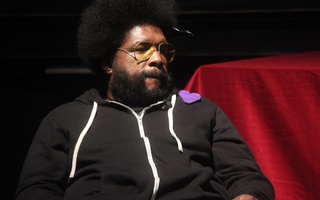The Foodbetter Harvard Initiative held a cornucopia of events last week, ranging from panels with celebrity chefs to a sustainability and innovation fair, intended to promote conversations about healthy and sustainable food choices on campus.
First organized in 2014 and sponsored by the Office of the Executive Vice President, the Foodbetter Harvard Initiative is a University-wide collaboration between the Harvard Food Law and Policy Clinic, Harvard University Dining Services, the Food Literacy Project, and the Office for Sustainability.
Colin B. Durrant, communications director for the Office for Sustainability, said this year’s Foodbetter programming was meant to focus more on including perspectives from across the University.
“This year’s celebration builds on earlier grassroots efforts in that it’s a true University-wide, multidisciplinary, One Harvard event, focused on mobilizing and bringing the entire Harvard community of students, faculty, staff together with our neighboring communities to have a conversation around food,” Durrant said.
On the first day of the two-day summit, Heather A. Henriksen, director of the Office for Sustainability, addressed ways in which students can more actively engage with the topic of sustainability as part of her opening remarks.
A keynote conversation, which took place in the Science Center Plaza, included a panel of chefs, restaurant owners, and a professor of epidemiology and nutrition. Panelists explained their journeys with food, touching on the global health crisis and the future of sustainable culinary arts.
On the second day, attendees were able to explore the Sustainability and Innovation Fair, which featured businesses ranging from a solar energy specialist to local food enterprises, cooking student demonstrations, and speed lectures on innovations in food and food systems.
Grace E. Dhanraj '16, who spoke in a lecture on Foods of the Future, discussed her work with Bloom Bakery. Dhanraj created Bloom Bakery based on the goal of incorporating jellyfish into food to alleviate damage caused by jellyfish overpopulation in the marine ecosystem.
“I think the whole event was great for making students aware about all of the amazing projects that are taking place at Harvard and around Cambridge,” Dhanraj said.
The festival concluded with a Harvard Student Panel, featuring students from organizations like the Student Mental Health Liaisons, the Food Literacy Project, and the Undergraduate Council. In an interview after the panel, Emma V.R. Noyes ’18, an inactive magazine editor and an editorial director at food website Spoon University Harvard, praised the festival for highlighting the University’s efforts to make healthier, more sustainable dishes.
“We complain a lot about dining hall food,” Noyes said. “Yet we do nothing about our complaints, because the food is there and it has already been paid for. Before we can make any meaningful changes, we need to recognize how good we already have it. Then, we have a base upon which we can build."
Read more in University News
Extension School Students Rally for Degree Name ChangeRecommended Articles
-
School Agrees on Sustainability PrinciplesAll future Harvard development projects will be reviewed to ensure they are compliant with six broad “sustainability” principles, the University
-
Some Say Harvard's Greening Efforts Lack Student SupportSince University President Drew G. Faust and fellow deans made a public commitment to sustainability efforts in 2008, the University has passed several milestones in its campaign to become more environmentally friendly.
-
Students Launch Fund for Green ProjectsA student-run website launched last week will connect sustainability projects on Harvard’s campus to potential donors, paving the way for green improvements to University facilities, including LED lights in the Quad and a new dishwasher for Cabot Cafe.
-
 Sustainability Office Relocates to Harvard Square
Sustainability Office Relocates to Harvard Square -
 'Tonight Show' Drummer Connects Music and Food
'Tonight Show' Drummer Connects Music and Food













